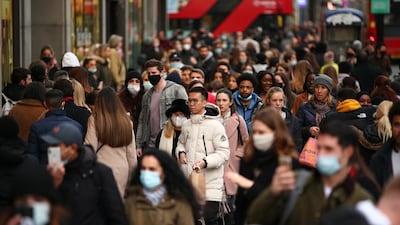UK inflation rose to 0.6 per cent in December, a slightly higher rate than expected despite Covid-19 restrictions that forced non-essential shops to shut for part of the month.
Consumer prices were up from a 0.3 per cent annual increase in November, the UK's Office for National Statistics said on Wednesday, driven higher by transport and clothing costs. Economists had expected a 0.5 per cent increase in December.
“Clothing prices put upward pressure on inflation in December, despite some evidence of continued discounting. Transport costs, including air, sea and coach fares, as well as petrol prices, rose as some travel restrictions eased during parts of the month,” said ONS statistician Jonathan Athow.
“These were partially offset by falling food prices, most notably for vegetables and meat.”
The headline inflation rate has now remained less than half of the Bank of England’s 2 per cent goal since April, although economists expect a sharp rebound when a sales tax cut for hospitality venues expires in April.
Thomas Pugh, UK economist at Capital Economics, said December’s rise in the Consumer Price Index may represent the first step on a climb towards a peak of about 2.5 per cent by the end of the year.
Inflation will probably start to rise more sharply from April when the temporary VAT cut for the hospitality sector is reversed and the recent rises in agricultural and energy commodities start to make themselves felt, Mr Pugh said.
“Together these forces could lift inflation to more than 2 per cent by the end of the year. But ample spare capacity means it will probably settle at close to 1.5 per cent by the end of next year," he said.
The biggest driver of December’s rise in inflation was transport inflation, which jumped to 7.2 per cent from 3.4 per cent in November as airfares rose, despite fewer people travelling, along with rail and sea ticket prices.
Clothing inflation also rose, to minus 1.8 per cent from minus 3.6 per cent, as the traditional December discounting was disrupted by the rising number of coronavirus cases and subsequent restrictions.
Shops in London, for example, were allowed to reopen in the first week of December after a November lockdown reduced infections, with shoppers pouring into the capital to buy gifts before the Christmas period. However, shops shut again on December 16 after Covid-19 rebounded and London was plunged into Tier 4 restrictions.
Looking ahead, Mr Pugh said that inflation “may creep higher” if the authorities keep monetary and fiscal policy loose "after all the spare capacity in the economy has been absorbed".


